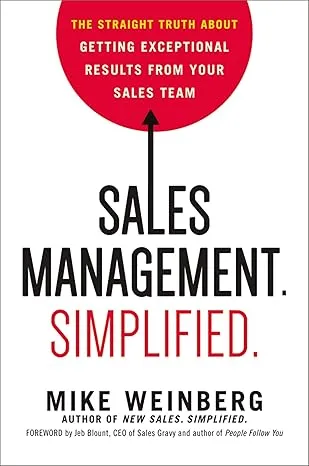About this book
Five Key Takeaways
- Strong leadership drives overall organizational sales success.
- Sales managers should uplift teams, not overshadow them.
- Compensation plans must encourage desired sales behaviors.
- Coaching in the field enhances sales effectiveness.
- Individual business plans foster accountability and ownership.
-
Leadership Quality Determines Sales Success
Effective sales leadership is a key determinant of organizational success. A strong leader shapes the sales culture and directly influences team performance (Chapter 1).
When leaders prioritize critical responsibilities, sales teams thrive. Conversely, poor leadership leads to weak results, harming business growth and staff morale.
This fact underscores the importance of leaders focusing on their role rather than getting distracted by non-revenue tasks.
In reality, businesses with well-trained leaders foster high-performing sales environments. Investing in leadership development is crucial for sustainable success.
Without proper leadership, companies face lackluster sales, employee disengagement, and missed opportunities for growth in competitive markets.
Organizations must evaluate how well they invest in developing their leaders. Poor investment harms both culture and outcomes over time.
This connection between leadership and sales performance makes leadership training a cornerstone for thriving teams.
In the end, "as goes the leader, so goes the organization." Building effective leaders ensures sales excellence and sustainable advancement.
-
Sales Managers Must Become Hero-Makers
Sales managers often adopt a "hero complex," prioritizing their own success over nurturing their teams. This mindset undermines sales team growth.
The problem arises when managers try to "save the day," stifling team creativity and blocking development of critical sales skills.
Such behavior negatively impacts morale, causing teams to feel undervalued and disengaged. Over time, team performance suffers significantly.
The author suggests managers reframe their role as "hero-makers," enabling their teams to shine and achieve standout results.
Through self-reflection and intentional change, managers can create environments that foster collective achievements and mutual trust.
Sales managers who celebrate team success over personal glory inspire loyalty, build stronger teams, and improve overall results.
Managers who prioritize empowerment over control lead teams capable of adapting and thriving in competitive markets.
Having teams that own their success creates lasting impacts. A "hero-maker" approach builds results-driven, resilient, and motivated teams.
-
Align Compensation with Desired Behaviors
Compensation plans are vital in shaping sales teams' behaviors. When misaligned, they hinder motivation and performance (Chapter 4).
To drive new business, tie compensation to specific achievements, like acquiring new clients. This encourages effort in strategic areas.
Poorly designed plans often disincentivize top performers, suggesting mediocrity is acceptable. Broaden the pay gap to reward excellence.
Focusing on new business commissions over repeat sales ensures hunters are motivated and urgency to find clients is established.
By revising compensation structures thoughtfully, managers create teams driven to achieve outstanding results through aligned priorities.
Following this advice builds engagement, recognizing high achievers while preventing stagnation. It balances team motivation long-term.
Ignoring this can lead to dissatisfied top performers leaving, ultimately damaging sales culture and organization outcomes.
-
Invest in Continuous Coaching
Modern sales teams lack fundamental training as managers are distracted by administrative work (Chapter 6).
Managers must prioritize regular coaching, including ride-alongs, skills workshops, and consultative sales modeling techniques.
This hands-on approach ensures salespeople adapt effectively to informed buyers, building tailored solutions instead of generic pitches.
Coaching improves team competence and aligns them with modern sales demands. Without it, teams stagnate while competitors innovate.
Investing in coaching strengthens relationships, refines selling techniques, and equips sales teams to meet dynamic market challenges.
Over time, productive coaching transforms underperforming teams into confident, proactive consultative sellers who consistently deliver value.
Neglecting this leads to skills gaps, disconnection from clients, and declining results, all of which hurt long-term success.
-
Sales Managers Overlook Fieldwork Benefits
Fieldwork is often ignored by sales managers, who focus instead on reports and desk-based evaluations (Chapter 8).
Spending time alongside salespeople during calls reveals nuances about their skills and the market that data can't capture.
Observing customer interactions gives clarity on sales team strengths, challenges, and unexplored opportunities, improving coaching methods.
Fieldwork also builds rapport, signaling team members' value while fostering collaboration and open communication within teams.
Managers disconnected from field experiences struggle to adapt strategies or align their teams with actual market conditions.
When prioritized, fieldwork provides actionable insights, strengthens team dynamics, and boosts alignment between strategy and execution.
Sales managers who invest in fieldwork lead better-performing, more engaged teams. Ignoring this opportunity hampers leadership effectiveness.
-
Sales Management Hinges on Three Pillars
Sales management feels overwhelming due to its broad scope, leaving managers unsure where to focus their efforts (Chapter 9).
This leads to wasted resources, inefficiencies, and underperforming teams struggling with unclear priorities and inconsistent results.
The challenge is immense because it affects every aspect of team engagement, leadership, and overall sales processes.
The author argues that breaking sales management into 3 pillars—Leadership & Culture, Talent Management, and Sales Process—is key.
Focusing on leadership creates positive cultures. Managing talent ensures the right people excel. Strong processes streamline performance.
This structure avoids overwhelm by providing a roadmap. Managers who concentrate here achieve consistent productivity and higher morale.
Proof of this effectiveness is demonstrated across high-functioning sales teams that focus on these key areas over generalized strategies.
-
Use Individual Plans for Focus
Sales managers often struggle to monitor individual performance effectively without clear benchmarks (Chapter 10).
Requiring salespeople to create individual business plans defines goals, strategies, obstacles, and personal growth areas.
Managers should use these plans as tools for regular accountability discussions, providing clear progress evaluation frameworks.
Plans foster ownership and encourage team members to step up, enabling better alignment between individual and organizational aims.
The team benefits from collaboration when plans are shared, allowing peers to refine strategies and learn mutually.
Well-structured plans keep goals actionable, ensuring steady progress and reducing inefficiencies from vague task prioritization.
Ultimately, individual plans cultivate accountability and growth, propelling collective team momentum toward exceptional results.




















